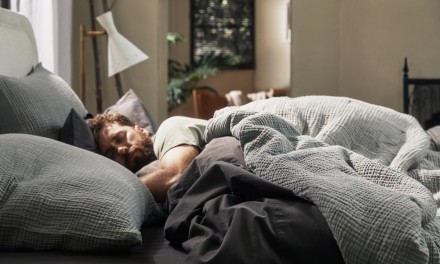If you have trouble falling asleep once in a while (or more often than not), you might be considering melatonin as a possible solution. The supplement can help you get the shut-eye you crave or recover from jet lag. It may also help provide relief for people with certain sleep disorders, like insomnia and delayed sleep phase syndrome.
But before you take any supplement, it's important to weigh the benefits of melatonin sleep aids against the potential drawbacks and other considerations.
So — How long does melatonin last? How long does it take to start working, and when should you take it? Keep reading for answers to these questions, along with insight into this increasingly popular sleep supplement and tips for getting a good night's rest.
What Is Melatonin?
What Is Melatonin?
Melatonin is a hormone produced naturally by the body. The brain releases more when it's dark and less when it's light outside (or stimulated by artificial lights). Melatonin plays a big role in your circadian rhythm — your natural 24-hour sleep/wake cycle — and ultimately helps you fall asleep.
While most people produce enough melatonin, many still find it hard to fall asleep when the time comes to wind down. You can buy melatonin supplements over-the-counter (OTC) that can help you doze off quicker and stay asleep.
For more on this topic, see our blog, Sleep: An Instinctual Necessity.
How Long Does It Take for Melatonin to Work?
When taken in pill form, melatonin absorbs quickly and takes about an hour to start working. At that point you'll begin feeling noticeably sleepy. Melatonin will transition you to peak-level drowsiness and fatigue in about two or three hours, though results will vary slightly from person to person
For some, melatonin might start working within 20 minutes, while others may metabolize it slower, with noticeable effects taking closer to two hours.
Melatonin Dosage and Absorption
Most over-the-counter melatonin supplements are 1 to 5 milligrams (mg) per dose, though you'll also find stronger 10-milligram pills. Some caplets are dissolvable, meaning you place them under your tongue and wait for them to melt. There are also regular pills you swallow, though they usually don't absorb as quickly as the dissolvable tabs.
If you've never taken melatonin before, it's probably best to start with a low dose. And be sure to check in with your healthcare provider first.
How Long Does It Take for Melatonin to Work?
When taken in pill form, melatonin absorbs quickly and takes about an hour to start working. At that point you'll begin feeling noticeably sleepy. Melatonin will transition you to peak-level drowsiness and fatigue in about two or three hours, though results will vary slightly from person to person
For some, melatonin might start working within 20 minutes, while others may metabolize it slower, with noticeable effects taking closer to two hours.
Melatonin Dosage and Absorption
Most over-the-counter melatonin supplements are 1 to 5 milligrams (mg) per dose, though you'll also find stronger 10-milligram pills. Some caplets are dissolvable, meaning you place them under your tongue and wait for them to melt. There are also regular pills you swallow, though they usually don't absorb as quickly as the dissolvable tabs.
If you've never taken melatonin before, it's probably best to start with a low dose. And be sure to check in with your healthcare provider first.
How Long Does Melatonin Last?
How Long Does Melatonin Last?
Melatonin typically lasts about five hours. This means the drowsiness will wear off five hours after taking effect — or roughly six hours after you take it, provided it takes an hour to kick in. By the five-hour mark, melatonin is likely almost entirely absorbed by the body and stops working.
For this reason, it’s often recommended to take melatonin within an hour before you want to go to sleep. Remember that everyone will react differently to the supplement, and the exact duration depends on various factors like dosage, age and body weight.
Extended-release vs. regular melatonin
Melatonin pills come in regular caplets and extended-release form. The regular pills start working almost immediately, as soon as they dissolve in your mouth or stomach.
Extended-release melatonin, on the other hand, dissolves slower. This means the drowsy effects are released over a longer period, which is more in line with how the body naturally produces the hormone while you sleep at night.
Sometimes called slow-release or time-release melatonin, this form of the sleep aid may last around seven to eight hours. Since most people sleep longer than five hours, it might be a better option for those who have trouble not only falling asleep but also staying asleep.
Your healthcare provider can help you figure out whether regular or time-release melatonin is best for your unique needs and situation.
How long does melatonin stay in your system?
In most cases, melatonin doesn’t stay in your system long. In most cases, your body will clear the melatonin out completely within about five hours. Extended-release melatonin pills can last longer, coming closer to seven or eight hours. Melatonin’s effects get weaker before wearing off completely.
The half-life of melatonin is between one to two hours. This means the supplement's full concentration is cut in half within one to two hours of taking it, then it'll be entirely gone in a few more hours.
Melatonin FAQs
Find answers to frequently asked questions about melatonin below.
When Should I Take Melatonin?
Melatonin takes an hour or so to kick in, so it's best to take it about an hour before you'd like to be asleep. For some, the dissolvable tablets may start working within 30 minutes. The first time you take melatonin, note how long it takes to start working, so you can adjust your timing next time.
Is It OK to Take Melatonin Every Night?
Melatonin is considered safe for short-term use. According to the Mayo Clinic, you're unlikely to develop a dependence on the sleep aid, meaning you'll probably still be able to fall asleep without it if you're tired enough. However, if you take it every night, you could develop a slight tolerance.
This means your typical low-dose melatonin will no longer offer the same results. You might need a higher dosage of melatonin to fall asleep quickly or feel like it just doesn't work as well as it used to.
Does Melatonin Make It Hard to Wake Up?
Since melatonin wears off within five hours of taking it, it doesn't typically make it harder to wake up in the morning. Having said that, taking it at the right time is key.
As noted, it's best to take melatonin 30 to 60 minutes before you'd like to fall asleep rather than an hour or two after you've already gone to bed or in the middle of the night when you're tossing and turning. If you take it within five hours of your alarm going off, it may still be in your system and could result in a groggy feeling until it wears off.
Does Melatonin Make You Tired the Next Day?
Some people might experience daytime drowsiness after taking melatonin the night before. But not everyone will notice this side effect, especially when they take the supplement as directed, about an hour before bedtime.
Melatonin FAQs
Find answers to frequently asked questions about melatonin below.
When Should I Take Melatonin?
Melatonin takes an hour or so to kick in, so it's best to take it about an hour before you'd like to be asleep. For some, the dissolvable tablets may start working within 30 minutes. The first time you take melatonin, note how long it takes to start working, so you can adjust your timing next time.
Is It OK to Take Melatonin Every Night?
Melatonin is considered safe for short-term use. According to the Mayo Clinic, you're unlikely to develop a dependence on the sleep aid, meaning you'll probably still be able to fall asleep without it if you're tired enough. However, if you take it every night, you could develop a slight tolerance.
This means your typical low-dose melatonin will no longer offer the same results. You might need a higher dosage of melatonin to fall asleep quickly or feel like it just doesn't work as well as it used to.
Does Melatonin Make It Hard to Wake Up?
Since melatonin wears off within five hours of taking it, it doesn't typically make it harder to wake up in the morning. Having said that, taking it at the right time is key.
As noted, it's best to take melatonin 30 to 60 minutes before you'd like to fall asleep rather than an hour or two after you've already gone to bed or in the middle of the night when you're tossing and turning. If you take it within five hours of your alarm going off, it may still be in your system and could result in a groggy feeling until it wears off.
Does Melatonin Make You Tired the Next Day?
Some people might experience daytime drowsiness after taking melatonin the night before. But not everyone will notice this side effect, especially when they take the supplement as directed, about an hour before bedtime.
Is Melatonin Safe?: Melatonin Overuse and Dangers
Melatonin is considered safe, particularly for short-term use. But taking too high a dose could make you feel dizzy, nauseous or abnormally sleepy the following day.
Also, bear in mind that since it's an over-the-counter supplement rather than a prescription medication, melatonin isn't strictly regulated by the FDA (Food and Drug Administration). It's almost like a vitamin in the sense that there can be little quality control among manufacturers.
Melatonin Side Effects
The most common side effects of melatonin include dizziness, nausea and daytime drowsiness. Some people who take melatonin might also experience headaches.
Less common side effects may include nightmares or otherwise vivid dreams, irritability, feelings of depression, confusion, mood swings and reduced alertness during the day.
Like any new supplement, it's best to talk to your healthcare provider before taking melatonin for sleep.
Melatonin and Alcohol
Like melatonin, alcohol can make you feel sleepy. But it can also temporarily reduce how much of the hormone your body produces. In addition to lessening the effects of a melatonin sleep aid, drinking alcohol might delay your body's melatonin production. Then when your body finally makes more the following day, you might feel extra tired.
Is Melatonin Safe?: Melatonin Overuse and Dangers
Melatonin is considered safe, particularly for short-term use. But taking too high a dose could make you feel dizzy, nauseous or abnormally sleepy the following day.
Also, bear in mind that since it's an over-the-counter supplement rather than a prescription medication, melatonin isn't strictly regulated by the FDA (Food and Drug Administration). It's almost like a vitamin in the sense that there can be little quality control among manufacturers.
Melatonin Side Effects
The most common side effects of melatonin include dizziness, nausea and daytime drowsiness. Some people who take melatonin might also experience headaches.
Less common side effects may include nightmares or otherwise vivid dreams, irritability, feelings of depression, confusion, mood swings and reduced alertness during the day.
Like any new supplement, it's best to talk to your healthcare provider before taking melatonin for sleep.
Melatonin and Alcohol
Like melatonin, alcohol can make you feel sleepy. But it can also temporarily reduce how much of the hormone your body produces. In addition to lessening the effects of a melatonin sleep aid, drinking alcohol might delay your body's melatonin production. Then when your body finally makes more the following day, you might feel extra tired.
Tips for Sleeping Soundly
Tips for Sleeping Soundly
Whether you decide to use melatonin or not, following these tips can help you sleep more soundly.
Minimize Caffeine Consumption
You already know caffeine helps you feel alert. But drinking too much coffee, tea or soda throughout the day (or drinking it in the afternoon or evening) could make it harder to fall asleep at night.
Eliminate All Light
Your body produces melatonin when it's dark. Eliminating all light in your bedroom (including natural and artificial sources) might help you make more of the hormone naturally without needing a sleep aid.
Blackout drapes may help. See our guide to the Best Curtain Colors, Sizes, Materials and Decor Ideas for tips.
Turn Off Electronics
Doom-scrolling on your phone isn't an ideal way to spend your final waking hour, but not just because it's a stressful activity. The blue light of your electronic devices can inhibit melatonin production and make it harder to fall asleep.
Try a White Noise Machine
A white noise machine can drown out disruptive sounds, replacing them with a more soothing audio experience, and ultimately help you fall asleep and stay asleep.
Explore these 27 Bedroom Essentials for Your At-Home Oasis.
Go to Bed at the Same Time Every Night
Going to bed at the same time every night might help regulate your circadian rhythm. The idea is that if you get into a habit of winding down at the same time, your body will start feeling sleepy at that hour each night.
Invest in a High-Quality Mattress, Pillows and Bedding
Calming an overactive mind is one thing, but you should also feel physically comfortable in your bed. Check out these guides for tips on buying the right mattress, pillows and bed linens.
When you're ready to upgrade your sleeping quarters, Parachute has everything you need. From high-quality, naturally sourced bedding to a pressure-relieving mattress to bed pillows for every sleeping style, you'll find it all here.
Browse our collections today.
Article Sources:
1. Mayo Clinic Staff.Melatonin. Mayo Clinic. 2021. Web.
2. Costello RB, et al.The effectiveness of melatonin for promoting healthy sleep: a rapid evidence assessment of the literature. Nutr J. 2014;13:106. doi:10.1186/1475-2891-13-106
3. Wade AG, et al.Efficacy of prolonged release melatonin in insomnia patients aged 55-80 years: quality of sleep and next-day alertness outcomes. Curr Med Res Opin. 2007 Oct;23(10):2597-605. doi: 10.1185/030079907X233098. PMID: 17875243.
4. Festic E.Efficacy of Extended Melatonin on sleep cycle in patients with PD and RBD. Mayo Clinic. Web.
5. Gooneratne NS, et al. Melatonin pharmacokinetics following two different oral surge-sustained release doses in older adults. J Pineal Res. 2012;52(4):437-445. doi:10.1111/j.1600-079X.2011.00958.x
6. Bauer BA. Is melatonin a helpful sleep aid — and what should I know about melatonin side effects?. Mayo Clinic. 2022. Web.
7. Danel T, Touitou Y. Alcohol consumption does not affect melatonin circadian synchronization in healthy men. Alcohol Alcohol. 2006 Jul-Aug;41(4):386-90. doi: 10.1093/alcalc/agl036. Epub 2006 May 5. PMID: 16679342.
8. Tähkämö L, et al. Systematic review of light exposure impact on human circadian rhythm. Chronobiol Int. 2019 Feb;36(2):151-170. doi: 10.1080/07420528.2018.1527773. Epub 2018 Oct 12. PMID: 30311830.







